Summer Opening Hours
During August and the first half of September the Library will open at 9.00am and close at 5.30pm. The Library will also close for two weeks from Monday 12 August to Friday 23 August. We will reopen on Tuesday 27 August after the bank holiday.
Saturday Opening
One of the four Inn Libraries is open from 10.00am to 5.00pm on each Saturday during the legal terms.
May
25 May: CLOSED
June
1 June: Inner Temple
8 June: Lincoln’s Inn
15 June: Middle Temple
22 June: Gray’s Inn
29 June: Inner Temple
July
6 July: Lincoln’s Inn
13 July: Middle Temple
20 July: Inner Temple
27 July: CLOSED
There is no Saturday opening during August and the first half of September.
This timetable gives the latest details of the Saturday opening of all four Inn Libraries.
Bookmarks
For Call Night earlier this year, we created some new bookmarks of Inner Temple members, past and present, to inspire those at the start of their careers at the Bar. These were based on the Inner Temple Firsts exhibition on the 4th Floor of the building. They are now freely available in the Library.
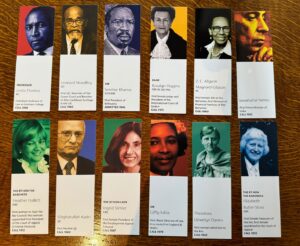
The Library of Things
In 2023, we began reviewing the library and its services to enhance accessibility and user experience. Our benchmarking exercise involved auditing accessibility information on over 100 university websites, helping us identify inclusive equipment, software, and service adaptations.
As a result, we introduced our ‘Library of Things’, offering a variety of computer peripherals and equipment for adapting study spaces.
What is a Library of Things? A Library of Things is a collection of useful objects or tools that can be borrowed by Library users. These are usually displayed in a way that allows users to easily browse and select what they need.
At the time of writing, our Library of Things contains:
- Adjustable arm rests
- Book rests
- Coloured overlays
- Disposable ear plugs
- Document holders
- Foot rests
- Headphones
- High contrast keyboard
- Large print keyboard
- Portable magnifier
- Reading lamp
- Reading ruler
- Tinted paper (lined)
- Trackball
- Trackpad
- Vertical mouse
- Wrist rests
If you would like to try any of these items, we invite you to help yourself.
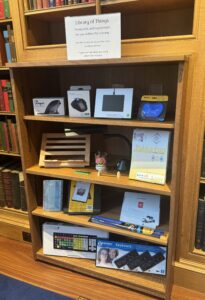
It is important to restate that these are only first steps. Embedding inclusive practices will be an ongoing project, but one which we are committed to.
Feedback, suggestions and comment can be sent to smclaren@innertemple.org.uk
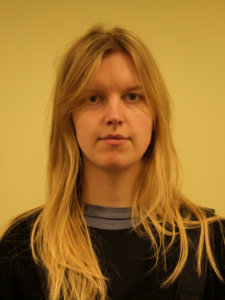 New Library Assistant
New Library Assistant
We welcome Karolina as a part-time Library Assistant working two days a week.
She says: “Previously I have worked as a gardener (and still do), and I volunteered at The Feminist Library in South London. I also studied History of Art at the University of York.”
CPD25 Visit to the Library
On 24 April 2024 members of CPD25 visited the Library.
CPD25 is the Staff Development and Training programme of the M25 Consortium of Academic Libraries. This Consortium is a collaborative organisation that strives to improve library and information services within the M25 region and across the East and Southeast. Members are from a wide variety of libraries and for some the visit to the Inner Temple was their first to a law library.
Attendees were given a tour of the Library and were shown an exhibition of various Library materials. These included some very early law texts, manuscripts from the Petyt collection, and volumes from Marshall Hall’s press cuttings collection.
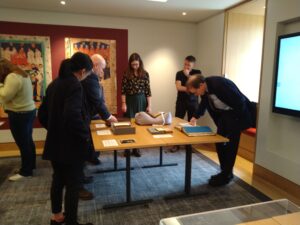
Current Awareness Blog
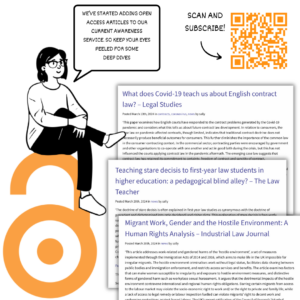
To subscribe: https://mailchi.mp/innertemple/subscribe
History Society Talk
On 18 March the Librarian and the former Master of Library, Master Sally Smith, delivered a talk for the Inner Temple History Society entitled ‘Snapshots of the Inner Temple Library’. Instead of the more usual ‘library history’ lecture that might have been expected, the speakers focused on their predecessors from the last 300 years, their lives, their work and the development of the Library under their direction.
Thirteen Librarians and over 120 Masters of the Library, condensed into a scant 50 minutes. This whistlestop voyage of discovery behind the titles of Librarian and Master of the Library revealed tales of both poverty and privilege across a diverse cast including butlers, a Master of the Library that never was, an esoteric collector, a hanging judge, a close friend of Lord Byron, cricketers, a librarian immortalised by Charles Lamb, historians, well reviewed authors of both fiction and non-fiction, a much denigrated law reporter, and two Readers of Temple Church.
As well as some interesting individuals, they revealed some ancient (but still very sensible) Library rules. The earliest of these was written by Samuel Carter, the Inn’s first Librarian:
“No person not a student or Bencher of the House shall make custom of daily coming and staying there as if it were his own chambers and ordering clients to attend him as if it were a coffee house”.
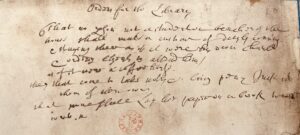
Although today you are very welcome to stay all day, bring your coffee, and book a space for a conference call with a client, one other Library rule from 1715 is still strictly enforced:
“No person to write upon any book that shall happen to lie before them”.
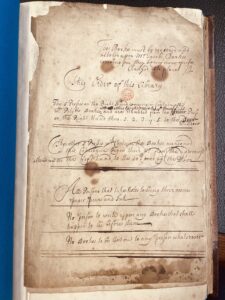
For those who missed the talk (including those who prioritised the Silks Day parties over History Society Lecture), fear not … The slides and recording of the talk are available on the Inn’s website.
New Acquisitions
One should not judge a book by its cover, but nonetheless it is gratifying to see that Master John Baker’s recent Sources of English Legal History: Public Law to 1750 (Oxford) has as its dust-jacket illustration our own Inner Temple Misc. Ms. 188, showing the Court of King’s Bench around 1560. A companion volume, covering private law, was published as long ago as 1986, a second edition appearing in 2010.
Legal Aspects of Cryptocurrency in the UK by Blake O’Donnell (Bloomsbury Professional) provides an introduction to cryptocurrency and its background, explaining the technology behind it, the different types of cryptocurrency, and how it is used in the UK. The focus is on regulatory issues relating to cryptocurrency, including the laws and regulations that govern its use and the challenges that arise because of its decentralised nature. O’Donnell discusses the taxation of cryptocurrency, including the rules for capital gains tax and income tax, and addresses the challenges that arise when dealing with cryptocurrency taxation given the anonymity of users and the difficulty of tracking transactions.
Emma Dunlop’s Access to Courts for Asylum Seekers and Refugees (Oxford) is the first monograph dedicated to article 16 of the 1951 Refugee Convention. Dunlop positions the article within the broader context of international human rights law, customary international law, and general principles of law, presenting a comprehensive account of asylum seekers’ and refugees’ right of access to courts. The author interrogates the scope and content of the article, evaluating the extent of its obligations. Despite developments in international human rights law since the article’s adoption, she argues that it remains a relevant and robust source of protection.
Members of Pump Court Tax Chambers have collaborated on Tax Litigation Handbook (Bloomsbury Professional), successor to the previously published Hamilton on Tax Appeals. It covers the tax appeals process (First Tier Tribunal and Upper Tier Tribunal litigation), including the types of decision that can be appealed and how an appeal can be brought. It also addresses procedures relating to other types of tax litigation, such as judicial review in the Upper Tier Tribunal, claims for professional negligence, insolvency procedures and High Court litigation. There is guidance on what happens at an appeal, and what the rules are for remote hearings which have become more common in recent times. The procedures and principles for seeking costs before the First Tier Tribunal are covered in a separate chapter.
Thanks are due to the following, who have presented books to the Library recently: Master James Goudie for Judicial Review by Supperstone, Goudie and Walker, 7th edition; Iain Goldrein KC for Ship Sale and Purchase, 7th edition; Master John Baker for Sources of English Legal History: Public Law to 1750; Christopher Sykes for Hamer’s Professional Conduct Casebook, 3rd edition and for The Law of Nuisance by John Murphy; Simon Mortimore KC for Company Directors: Duties, Liabilities and Remedies, 4th edition; Master Michael Tugendhat for Victoria University of Wellington law review : issue in honour of Professor A.T.H. Smith; and Master Mark Hill for Faith in Law, Law in Faith.
A list of new law titles and editions received from January to March is available.
Library Staff Run Abroad
Two members of the Library team ran a half marathon or full marathon abroad this year in difficult conditions. Congratulations to them both.
Lisbon Half Marathon
James, Senior Library Assistant, writes
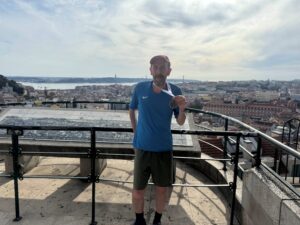
On 17 March I ran the Lisbon Half marathon. The start is wonderfully situated on the Ponte 25 de Abril, overlooked by the statute of Cristo Rei, before the route heads across the bridge into Lisbon, and continues along the coast and finishing at the Mosteiro dos Jerónimos in Belém.
The temperature was about 20 degrees Celsius, and coming from the bitter winter of the UK, I found the second half of the run quite a struggle in the warm conditions; so I was very grateful for the many water stops along the way and the ice cream being handed out at the end. I think they took pity on me as I was handed two ice creams instead of the usual one.
Rhodes Marathon
Tracey, Deputy Librarian, writes
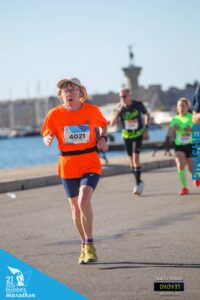
On 21 April I ran the Rhodes Marathon. This was not my first marathon, but it was my first outside of the UK. To prepare I had 4 months of training which included several 18-mile runs, plenty of long slow runs and a few speed sessions. I was feeling pretty well prepared come race day.
In the build up to race day I had a few worries about the heat but it wasn’t too bad: certainly much warmer than I had been training in. I made sure I had a decent hat, I carried my own water and had extra sun cream if it was required.
The race route was described as flat but that wasn’t quite the case – there were a few uphill stretches along the way and “undulating” might have been a better way to describe it. The route takes you along the coastline and is very pretty. Looking at the brilliant blue sea certainly took my mind off the steadily increasing tiredness.
I finished with a time just over the goal I set myself, but I was happy with my effort. I managed the heat and didn’t get sunstroke (which happened to me on a race at home last year).
The coffee and fries a couple of hours later rounded off the day nicely.

